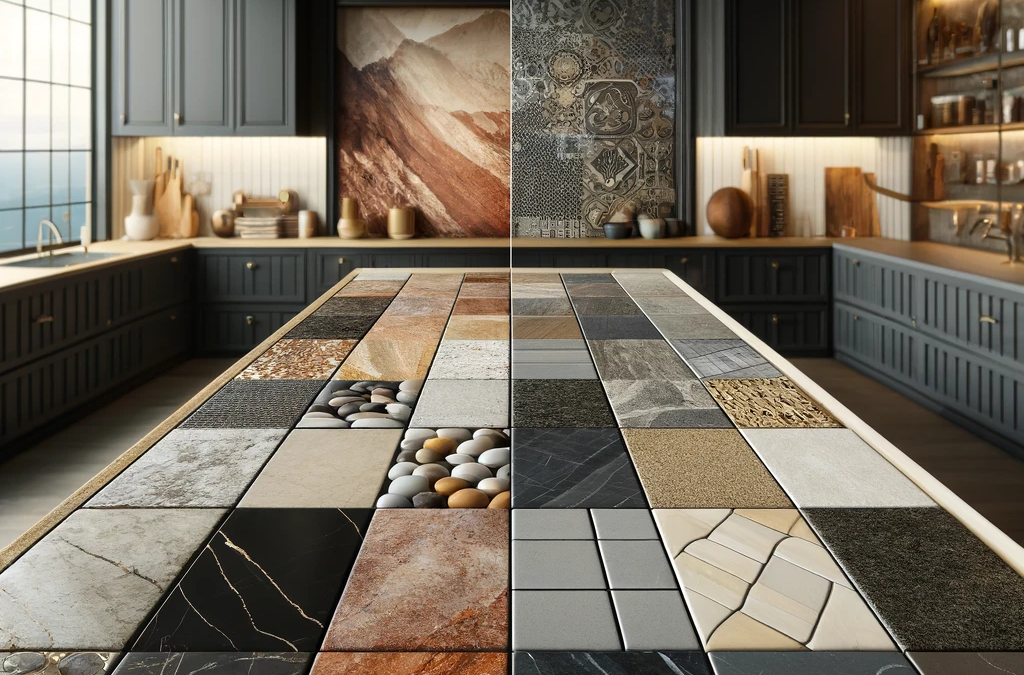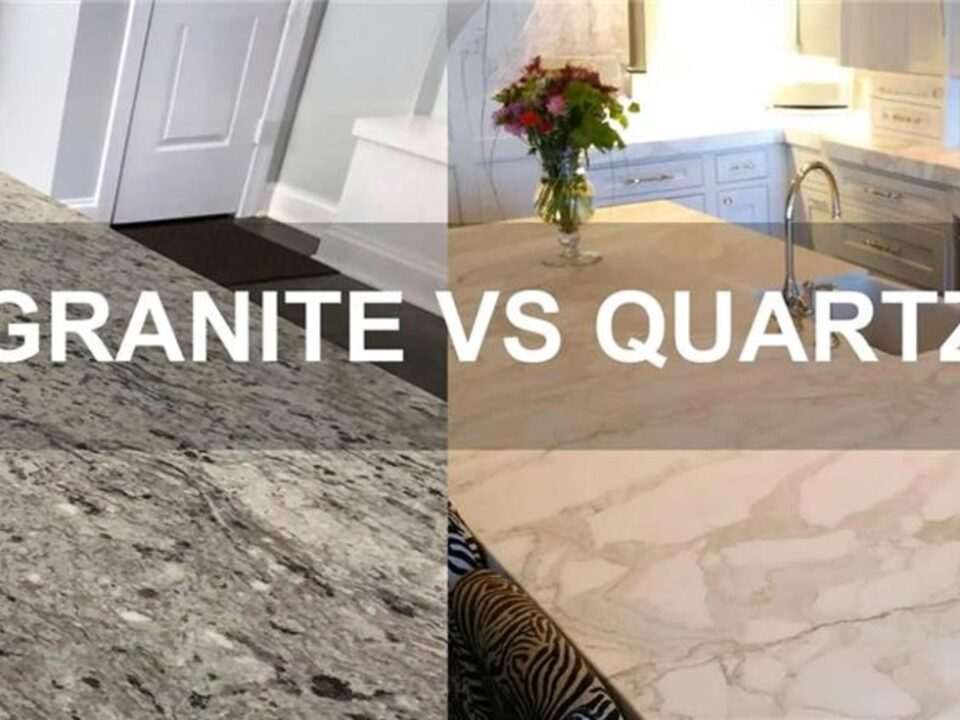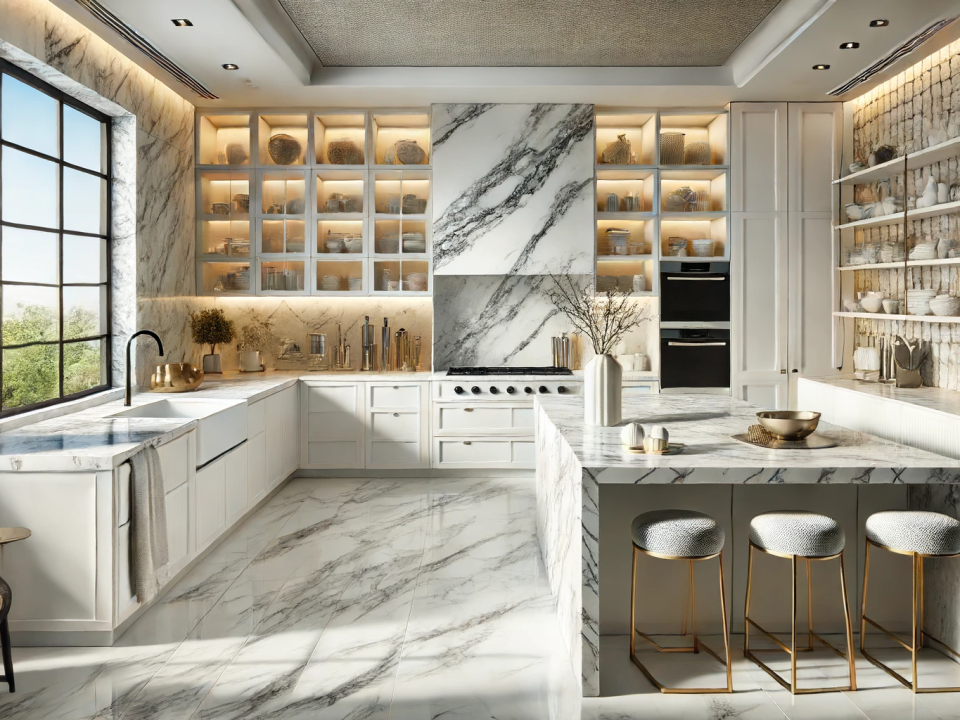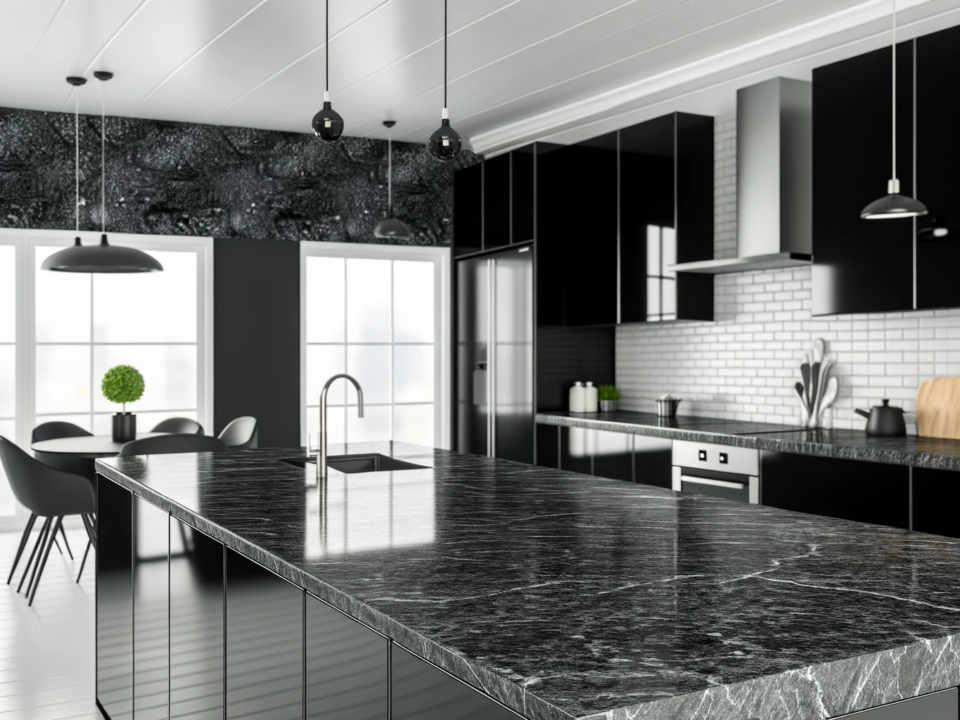
This is a complete guide that explains the ageless debate of Granite vs Tiles to readers who are thinking about which product is best for their home project purposes. When you are building or renovating your house, you have to make careful choices, especially regarding material selection that marries aesthetics with practicality.
More than any other innumerable options, tiles, and granites are preferred due to their unique advantages. Soni Granites and Mining Company is one of those granite companies known for its quality and reliability in the granite industry for over thirty years.
In this blog post, SGMC wants to provide useful information that should assist you in making an informed decision.
What is Granite?
Granite’s chemical makeup is distinguished by an impressive array of minerals, in which alumina and silica dominate. They are composed of quartz, potassium feldspar, and sodium feldspar, with a conspicuous majority being coarse grains.
Black granite is among the varieties of granite renowned for its rich coloration and rough texture. Soni Granites & Mining Company takes pride in bringing exceptional black granites, namely Luna Valor, Entre Sereno, Serene Crest, and Enigma Noir, from its own mine in Rajasthan. The finishes from SGMC range from polished to honed slabs to give spaces an enriched outlook that contains durability.
Moreover, black granite has a wide range of applications, including wall cladding or flooring, fireplace surrounds, and kitchen granite countertops. Thus, it remains an eternal investment because, apart from looking good at all times, it never wears out and is very durable.
What are Tiles?
In the Tile Flooring sector, vitrified tiles show a combination of utility and beauty. The vitrification process, which involves converting these tiles to a glass-like substance, allows them to retain their durability and sheen over long periods of use. They are available in several styles, sizes, and designs, thereby acting as a good replacement for traditional marble or stone tiles.
Comparing Granite vs Ceramic Tiles
| Basis | Vitrified Tiles | Granite | Comparison |
| What is it? | Factory manufactured tiles using a mixture of clay, quartz, and feldspar are fused at very high temperatures. | Natural stones are obtained from igneous rocks. | Granite is a natural stone, while vitrified tiles are manufactured. |
| Appearance | They come in several finishes, patterns, designs and colors. | Available in natural colors such as black, red, green, white, and grey. | Vitrified tiles offer a variety of artificial patterns, while granite displays natural color variations and patterns. |
| Availability | Available as tiles in various sizes: 300 x 300mm, 600 x 600 mm, 600 x 1200 mm, 800 x 800 mm, 800 x 1200 mm, and 1200 x 1200 mm; Each tile is usually 10-12 mm thick | Available as slabs; Can be cut to required size with minimal joints; Countertop thickness usually 20-30 mm, Flooring thickness usually 14-18 mm. | Vitrified tiles are generally offered as standardised dimensional tiles whereas granite can be customised. |
| Maintenance | Very low maintenance. | Very low maintenance. | Both materials require minimal maintenance. |
| Ease of laying | Very easy and quick. | Time-consuming and requires expertise. | Vitrified tiles are easier and quicker to install compared to granite. |
| Ease of cleaning | Very easy to clean. | Very easy to clean. | Both materials are easy to clean. |
| Cost | Starts from Rs 60 per sqft, upwards. | More expensive than tiles; Good quality slabs start from Rs 100 per sqft, with additional costs for skirting, borders, grooves, and inlays. | Vitrified tiles are generally more economical compared to granite. |
| Scratch resistance | Highly durable. | Highly durable. | Both materials are highly durable. |
| Water resistance | Impervious to water. | Impervious to water. | Both materials are impervious to water. |
| Application | Ideal for most surfaces, including heavy use surfaces such as kitchen tiles flooring, backsplash or floor surface in the restroom. | Suitable for countertops, flooring, walls, fireplace surrounds, bar tops, kitchen worktops, and cladding. | Vitrified tiles are versatile for various indoor surfaces, while granite is suitable for both indoor and outdoor applications. |
Granite
Pros
- Durable: Granite is one of the hardest stones, making it highly resistant to scratches, chips, and cracks, hence durable.
- Stain and Heat Resistant: Sealed granite is impervious to most stains, such as those from acidic foods and drinks, so it is highly heat resistant.
- Easy Maintenance: Regular sweeping and mopping with a mild detergent is all that’s required to keep granite clean.
Cons
- Costly: Granite is one of the more expensive flooring and countertop materials.
- Cold and Hard: Granite feels cold underfoot, especially in colder climates due to its hard nature.
- Heavy: Granite tiles are heavy, meaning they need a strong subfloor for installation purposes.
- Porous: Granite is naturally porous and needs to be sealed periodically to maintain its stain and water resistance.
Pros and Cons of Tiles
Pros
- Easy to Maintain: Easy to look after. A simple clean-up with broom or mop or, occasionally, deep cleaning is all that is required for tile floors.
- Relatively Affordable: Compared to granite, tiles have more variety in terms of price range, thus making them easily affordable.
- Comfortable Underfoot: Unlike granite, some tiles are warm to the touch and comfortable, especially when used together with radiant heat flooring.
Cons
- Can Chip or Crack: They may become broken if subjected to or dropped on by heavy objects even though they are strong enough.
- Cold Floors: Some tile materials, like ceramic, can feel cold underfoot, especially in colder climates.
- Installation Skill Required: While DIY tile installation is possible, professional installation is recommended for a flawless and long-lasting finish.
How to Choose Between Granite and Tiles
When deciding between granite or tiles, factors such as durability, aesthetics, maintenance and budget should be considered. Granite’s exceptional durability, particularly SGMC black granite, sets it apart from others due to its resistance to scratches, heat, and stains. This makes it useful in several applications, such as countertops, flooring, and backsplashes.
Real-Life Application: What Homeowners Say
US Homeowner (New York City):
Tiles are versatile and affordable; however, SGMC black granites beat them when it comes to longevity, demanding only minimal care over time.
Bangladeshi Homeowner (Dhaka):
In my bathroom remodelling, SGMC black granite easily beats the ceramic tiles traditionally used. In addition to giving my bathroom a spa-like look, they are also highly resilient to breaking and heat.
Jordanian Homeowner (Amman):
I took SGMC black granite pavers instead of tiles for my patio. The outdoor area looks more elegant due to the natural beauty of the granite.
Conclusion
For a home project, when you are confused about whether to use granite or tiles, SGMC black granite will definitely come out as the best choice. In all aspects, it is evident that SGMC black granites outdo tiles because of their unmatched strength, low maintenance requirements, beautiful look, and tolerance towards heat. For any homeowner who wants quality, sophistication, and durability in remodelling their homes’ countertops, floors, or even outdoor projects, then Soni Granites & Mining Company offers some of the best granites in India.
FAQs
Which is better: tiles or granite for stairs?
Usually, for staircases, granite is said to be better than tiles due to its more durable nature compared with that of the latter and its aesthetic value.
Which is best for the kitchen slab, granite or tiles?
In most cases, homeowners prefer using granite on kitchen slabs since it is long lasting, resistant to high temperatures and looks expensive.
Is granite harder than tile?
Yes, granite is harder than tile. In terms of hardness scale it has a Mohs rating much higher than most kinds of tile, thus making it more resistant to scratches and damages.
Read More: Cheap vs. Expensive Granite: A Comprehensive Comparison Guide.




